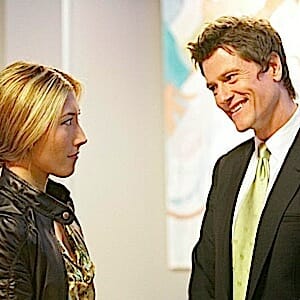Dollhouse: “Belonging” (Episode 2.4)

Air Date: October 23, 2009
Writers: Jed Whedon and Maurissa Tancharoen
Director: Jonathan Frakes
The fourth episode of Dollhouse’s second season is the series’ best since the last episode written by Jed Whedon (Joss’ brother) and his wife, Maurissa Tancharoen—the unaired “Epitaph One.” If the series must end after episode 13 of this season (as it looks fated to do), at least it’s going out with a bang.
“Belonging” is Sierra’s origin story. The episode begins with Sierra in her pre-Dollhouse, real identity, Priya. An Australian immigrant, she sells her art on the beach and meets Dr. Nolan Kinnard, who uses Dollhouse resources to woo Priya by throwing her an art show. She rebuffs him, saying “Nothing in this world could ever make me love you.” The screen swipes and we see present-day Sierra expressing her undying devotion to Kinnard. With a little prompting from Echo, Topher investigates the source of a sadness Sierra expresses in her paintings. He discovers that Kinnard had drugged her to make her appear psychotic, had her committed to the Dollhouse for “help” and then repeatedly rented her out for his pleasure. DeWitt, upset that Kinnard has made her “a party to something vile,” tells Kinnard (in a pithy scene that showcases her fining acting chops) that they will no longer be offering their services to him. He demands that Sierra be imprinted for permanent placement with him. DeWitt’s boss (Keith Carradine) orders her to follow through, warning she won’t like Rossam’s retirement program. She orders Topher, who imprints Priya’s original personality. She contronts Kinnard and kills him in the fight that ensues. Topher and Boyd clean up the mess and return Sierra to the Dollhouse.
So, what worked so well this episode? First and foremost, the episode was all raw emotion, set in a tragedy of Grecian proportions. Joss Whedon likes to talk about getting to the emotional truth of the situation, and his team did exactly that this time, with minimal fluff and few missteps. And it was a truth that’s at the heart of Dollhouse itself. The episdoe powerfully personalized the issues of power, control, identity, free will and human trafficking that have always been present. Priya’s situation was gut-wrenching enough on its own. When she killed Kinnard, you couldn’t help but cheer a little. But, where almost all other shows would have ended shortly after that “triumphant” note, Whedon pushes us where few, if any, shows dare to take us—immediately into the emotional aftermath. Priya is immediately devastated; Topher is devasted and wracked with guilt. Then Boyd makes Topher clean up. (“What are you talking about?” he asks. “Consequences,” Boyd replies.) Topher has to drain Kinnard’s blood and cut up the body for disposal. When we see him sawing off Kinnard’s foot and choking on the fumes from sulfuric acid, we feel his revulsion and any sense of triumph is long gone.
On a more basic level, the simply villainy of the doctor (and Carradine’s character) serves the show well. Episode two of this season, where Echo was programmed to be a new mother, reached for the same gut-wrenching emotions but missed the mark largely because the shady-turned-sympathetic husband left us with nothing but the amorphous Rossum corporation as villain. As I said in the review of the last episode, moral complexity works (and is preferred) for recurring characters, but with non-recurring ones, it’s hard to engage the viewer unless you really love or really loathe them. They made it easy to loathe this one and invest yourself in Sierra/Priya’s struggle.
-

-

-

-

- Curated Home Page Articles By Test Admin October 21, 2025 | 3:10pm
-

- Curated Home Page Articles By Test Admin October 21, 2025 | 2:57pm
- Urls By Test Admin October 21, 2025 | 2:57pm
- Curated Home Page Articles By Test Admin October 21, 2025 | 2:55pm
-

-

-

-

-

-

-

-

-

-

-

-

-

-

-

-

-

-

-

-

-

-

-

-

-

-

-

-

-

-

-




































